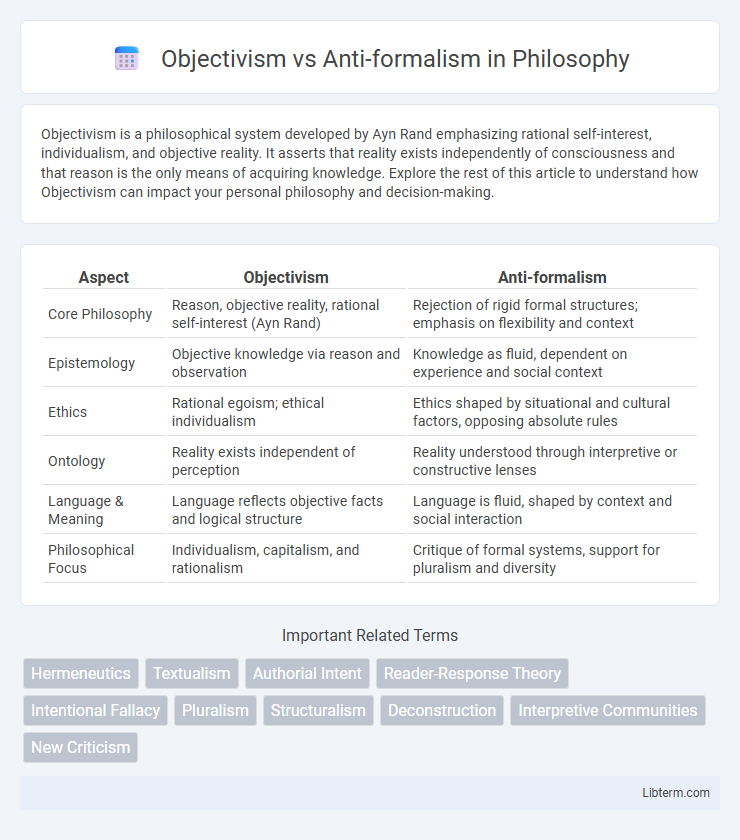Objectivism is a philosophical system developed by Ayn Rand emphasizing rational self-interest, individualism, and objective reality. It asserts that reality exists independently of consciousness and that reason is the only means of acquiring knowledge. Explore the rest of this article to understand how Objectivism can impact your personal philosophy and decision-making.
Table of Comparison
| Aspect | Objectivism | Anti-formalism |
|---|---|---|
| Core Philosophy | Reason, objective reality, rational self-interest (Ayn Rand) | Rejection of rigid formal structures; emphasis on flexibility and context |
| Epistemology | Objective knowledge via reason and observation | Knowledge as fluid, dependent on experience and social context |
| Ethics | Rational egoism; ethical individualism | Ethics shaped by situational and cultural factors, opposing absolute rules |
| Ontology | Reality exists independent of perception | Reality understood through interpretive or constructive lenses |
| Language & Meaning | Language reflects objective facts and logical structure | Language is fluid, shaped by context and social interaction |
| Philosophical Focus | Individualism, capitalism, and rationalism | Critique of formal systems, support for pluralism and diversity |
Understanding Objectivism: Core Principles
Objectivism centers on reality's objective existence independent of perceptions, emphasizing reason as the sole means of acquiring knowledge and advocating rational self-interest as the ethical foundation. This philosophy values individualism and rejects mysticism, promoting a reality understood through logic and empirical evidence. Its core principles include objective reality, reason, self-interest, and laissez-faire capitalism as the ideal sociopolitical system.
Defining Anti-formalism in Philosophy
Anti-formalism in philosophy challenges the rigid application of formal rules and structures, emphasizing context, meaning, and the fluidity of interpretation over fixed logical forms. It asserts that understanding ethical, legal, or aesthetic phenomena requires attention to particularities and human practices instead of abstract formal systems. This perspective opposes Objectivism's reliance on immutable, universal principles, advocating for a more dynamic and pragmatic approach to knowledge and value judgments.
Historical Origins of Objectivism and Anti-formalism
Objectivism emerged in the early 20th century as a philosophical response emphasizing objective reality and rational self-interest, primarily developed by Ayn Rand in the 1940s. Anti-formalism originated as a critique of rigid formal structures in art and literature during the mid-20th century, advocating for a focus on content and expression over strict adherence to established forms. The historical roots of Objectivism lie in Enlightenment ideas and classical philosophy, while Anti-formalism is deeply connected to modernist and postmodernist movements challenging traditional aesthetic norms.
Key Proponents and Influencers
Key proponents of Objectivism include Ayn Rand, who championed rational self-interest, and Leonard Peikoff, a leading advocate and interpreter of Rand's philosophy. Anti-formalism features influential thinkers such as Ludwig Wittgenstein, who emphasized the practical use of language over rigid formal rules, and Michael Dummett, who critiqued formal logical structures in favor of context-dependent meaning. Both movements shaped philosophical discourse by challenging each other's foundational premises on logic, ethics, and epistemology.
Objectivism in Art and Literature
Objectivism in art and literature emphasizes the portrayal of objective reality through clear, precise language and structured forms, aiming to reflect universal truths and human experience without subjective interpretation. It values clarity, discipline, and adherence to external realities, contrasting sharply with anti-formalism, which rejects rigid structures in favor of emotional expression and fluidity. This philosophy asserts that artistic works should be grounded in observable facts and logical coherence to maintain meaning and communicability.
Anti-formalism’s Critique of Rules and Structure
Anti-formalism critiques rigid adherence to rules and structures, arguing that such frameworks constrain creativity and fail to capture the fluidity of human experience. It emphasizes context, intuition, and the interpretive flexibility necessary to address complex, lived realities beyond formalistic boundaries. This perspective contrasts with Objectivism's focus on fixed principles and objective structures as essential for consistency and clarity.
Objectivism vs. Anti-formalism: Major Points of Contention
Objectivism emphasizes the independence of legal principles from social or political influences, advocating for objective interpretation based on established rules and facts. Anti-formalism challenges this rigidity, arguing that law should be flexible and responsive to social realities and context, thus opposing strict adherence to formal legal structures. Major points of contention include the role of judicial discretion, the relevance of legal formalism versus pragmatism, and whether law can be truly objective or is inherently shaped by external societal factors.
Implications for Ethics and Morality
Objectivism, rooted in rational self-interest and objective reality, asserts that ethical principles are universal and grounded in reason, emphasizing individual rights and personal responsibility. Anti-formalism challenges rigid ethical frameworks, advocating for contextual and flexible moral judgments that consider human relationships and cultural nuances. The contrast between these philosophies influences debates on moral absolutism versus relativism, impacting approaches to justice, human rights, and social policies.
Real-world Applications and Debates
Objectivism emphasizes adherence to formal logic and objective truths in fields such as law and ethics, advocating that clear, universal principles guide decision-making and policy development. In contrast, Anti-formalism argues for flexibility and context sensitivity, highlighting the importance of social, cultural, and individual factors that formal rules may overlook, especially in disciplines like linguistics and legal interpretation. The debate influences real-world applications by shaping approaches to constitutional law, programming language design, and educational methodologies, where rigid structures confront adaptive, user-centered practices.
Future Directions in the Objectivism vs. Anti-formalism Debate
Future directions in the Objectivism vs. Anti-formalism debate emphasize integrating cognitive science advancements to refine understanding of conceptual frameworks and knowledge representation. Emerging research explores how Objectivism's emphasis on objective reality and formal principles contrasts with Anti-formalism's contextual and pragmatic approaches to meaning and interpretation. Continued dialogue seeks to balance strict ontological claims with flexible linguistic practices, potentially fostering hybrid models that enhance philosophical and computational theories of meaning.
Objectivism Infographic

 libterm.com
libterm.com